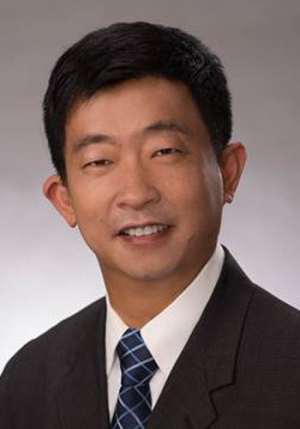Zhu Han has an idea that could remake a multi-billion dollar industry.
Wireless communication, with its spotty signal strength and slow download speeds, can be incredibly frustrating.
According to Han, a big part of the problem is that wireless spectrum — the radio frequencies used to send and receive wireless signals — is not used nearly as efficiently as it could be. At any given moment, the spectrum controlled by one wireless carrier in a given market (an AT&T or Verizon, for example) may be underused while another may be swamped with too much traffic. “If you do not control things very carefully, the different devices will compete with each other and use up resources very quickly,” said Han.
The obvious solution is to send wireless traffic to the spectrum that is most available, regardless of who controls it, he said. And the best way to do that is through the creation of new type of wireless service provider: cognitive radio providers.
This proposal, presented in the April 2009 edition of IEEE Wireless Communication Magazine, has won Han and his two co-authors the 2011 Fred Ellersick Prize Paper Award, honoring them for the best paper in an IEEE communications magazine during the past three years. They accepted the award last week at the IEEE’s International Conference on Communications in Kyoto, Japan.
The paper uses game theory to show how the existence of cognitive radio providers would help make the best use of all available wireless spectrum.
Through a third party, these companies would purchase unused slices of spectrum from the existing wireless carriers, and possibly even broadcast television operators. The firms would then offer traditional wireless contracts to customers.
Using software built into both the wireless network and smartphones, wireless traffic would automatically be directed to the most underused pieces of spectrum.
“Say you went to a very crowded place and unable to get access because of all the other people trying to access the network,” said Han. “So instead of trying to get on the Wi-Fi, your phone goes through the cell phone network because it is not as crowded…For you, it is transparent. You only know you’re connected. You don’t know if you’re on Verizon’s spectrum or AT&T’s, and you probably don’t care.”
In addition to making the lives of individuals a little bit easier, this approach better utilizes spectrum that is becoming increasingly crowded and increasingly important to modern society.
It also benefits the existing wireless carriers, Han said. When their spectrum goes underused, that is basically as money wasted. Selling their underused spectrum counts as money earned.
While the traditional wireless carriers may be resistant to helping a new competitor enter the market, the case for cognitive radio providers is so compelling that their hand may eventually be forced by regulators, said Han. “From the technical point of view, from the social welfare point of view from the customer point of view, this makes a lot of sense.”
